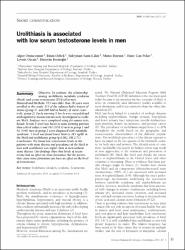| dc.contributor.author | Ötünçtemur, Alper | |
| dc.contributor.author | Özbek, Emin | |
| dc.contributor.author | Çakır, Süleyman Sami | |
| dc.contributor.author | Dursun, Murat | |
| dc.contributor.author | Polat, Emre Can | |
| dc.contributor.author | Özcan, Levent | |
| dc.contributor.author | Beşiroğlu, Hüseyin | |
| dc.date.accessioned | 2020-07-02T14:58:34Z | |
| dc.date.available | 2020-07-02T14:58:34Z | |
| dc.date.issued | 2015 | en_US |
| dc.identifier.citation | Ötünçtemur, A., Özbek, E., Çakır, S. S., Dursun, M., Polat, Emre C., Özcan, L. ve Beşiroğlu, H. (2015). Urolithiasis is associated with low serum testosterone levels in men. Archivio Italiano di Urologia e Andrologia, 87(1), 83-86. https://dx.doi.org/10.4081/aiua.2015.1.83 | en_US |
| dc.identifier.issn | 1124-3562 | |
| dc.identifier.issn | 2282-4197 | |
| dc.identifier.uri | https://dx.doi.org/10.4081/aiua.2015.1.83 | |
| dc.identifier.uri | https://hdl.handle.net/20.500.12511/5379 | |
| dc.description.abstract | Objective: To evaluate the relationship among urolithiasis, metabolic syndrome (MetS) and serum testosterone (T) level in men. Material and Methods: 513 men older than 18 years were enrolled in this study: 313 of the subjects had a history of stones (group 1) and 200 had no history of stones (controls, group 2). Early morning T levels were recorded and anthropometric measurements were invastigated to evaluate MetS. Analyses were completed using chi-square tests. Result: Serum T level was lower in stone forming patients than coltrol subjects and 161 (%51.4) men in group 1 and 92 (%46) men in group 2 were diagnosed with metabolic syndrome. T level was found lower limit (< 285 ng/dl) in the MetS and urolithiasis group (p 0.002, OR 2.71). Conclusions: We found low testosterone levels in the patients with stone disease and prevalance of the MetS in men with urolithiasis was higher than in men without stone disease. Our findings show that levels of testosterone had no effect on stone formation, but the factors that cause stone formation can have an effect on the level of testosterone. | en_US |
| dc.language.iso | eng | en_US |
| dc.publisher | PagePress Publications | en_US |
| dc.rights | info:eu-repo/semantics/openAccess | en_US |
| dc.subject | Urolithiasis | en_US |
| dc.subject | Metabolic Syndrome | en_US |
| dc.subject | Testosterone | en_US |
| dc.title | Urolithiasis is associated with low serum testosterone levels in men | en_US |
| dc.type | article | en_US |
| dc.relation.ispartof | Archivio Italiano di Urologia e Andrologia | en_US |
| dc.department | İstanbul Medipol Üniversitesi, Tıp Fakültesi, Cerrahi Tıp Bilimleri Bölümü, Üroloji Ana Bilim Dalı | en_US |
| dc.authorid | 0000-0001-5254-2563 | en_US |
| dc.identifier.volume | 87 | en_US |
| dc.identifier.issue | 1 | en_US |
| dc.identifier.startpage | 83 | en_US |
| dc.identifier.endpage | 86 | en_US |
| dc.relation.publicationcategory | Makale - Uluslararası Hakemli Dergi - Kurum Öğretim Elemanı | en_US |
| dc.identifier.doi | 10.4081/aiua.2015.1.83 | en_US |
| dc.identifier.scopusquality | Q3 | en_US |


















